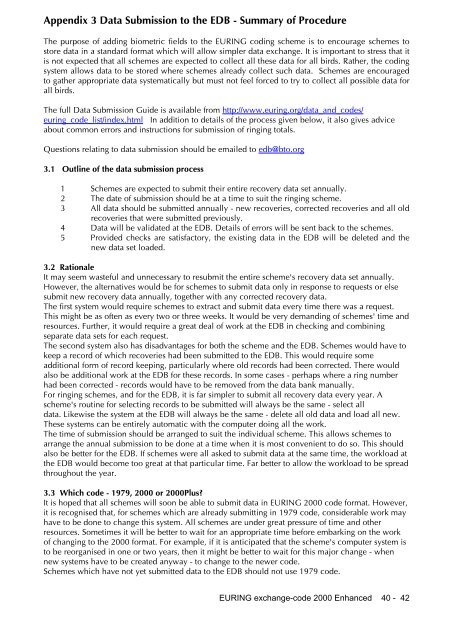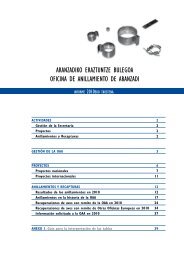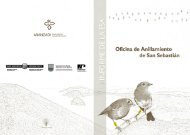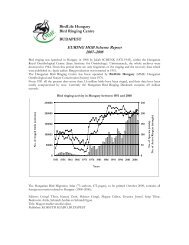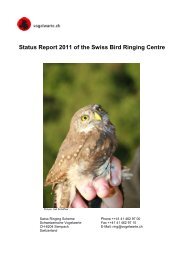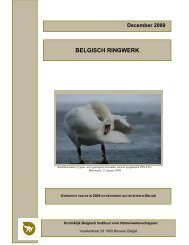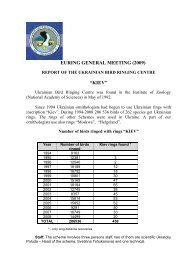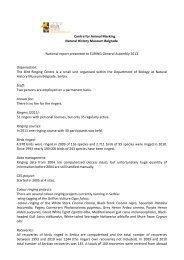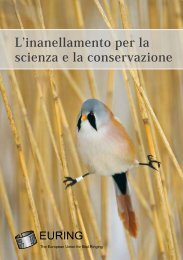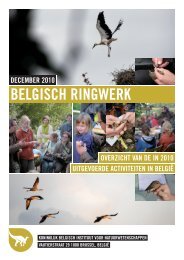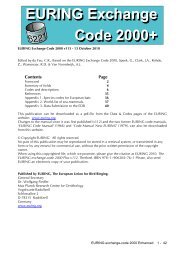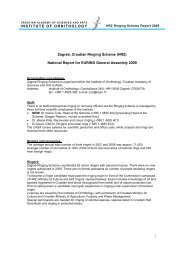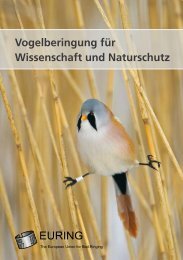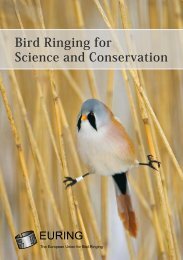here - The European Union for Bird Ringing
here - The European Union for Bird Ringing
here - The European Union for Bird Ringing
You also want an ePaper? Increase the reach of your titles
YUMPU automatically turns print PDFs into web optimized ePapers that Google loves.
Appendix 3 Data Submission to the EDB - Summary of Procedure<br />
<strong>The</strong> purpose of adding biometric fields to the EURING coding scheme is to encourage schemes to<br />
store data in a standard <strong>for</strong>mat which will allow simpler data exchange. It is important to stress that it<br />
is not expected that all schemes are expected to collect all these data <strong>for</strong> all birds. Rather, the coding<br />
system allows data to be stored w<strong>here</strong> schemes already collect such data. Schemes are encouraged<br />
to gather appropriate data systematically but must not feel <strong>for</strong>ced to try to collect all possible data <strong>for</strong><br />
all birds.<br />
<strong>The</strong> full Data Submission Guide is available from http://www.euring.org/data_and_codes/<br />
euring_code_list/index.html In addition to details of the process given below, it also gives advice<br />
about common errors and instructions <strong>for</strong> submission of ringing totals.<br />
Questions relating to data submission should be emailed to edb@bto.org<br />
3.1 Outline of the data submission process<br />
1 Schemes are expected to submit their entire recovery data set annually.<br />
2 <strong>The</strong> date of submission should be at a time to suit the ringing scheme.<br />
3 All data should be submitted annually - new recoveries, corrected recoveries and all old<br />
recoveries that were submitted previously.<br />
4 Data will be validated at the EDB. Details of errors will be sent back to the schemes.<br />
5 Provided checks are satisfactory, the existing data in the EDB will be deleted and the<br />
new data set loaded.<br />
3.2 Rationale<br />
It may seem wasteful and unnecessary to resubmit the entire scheme's recovery data set annually.<br />
However, the alternatives would be <strong>for</strong> schemes to submit data only in response to requests or else<br />
submit new recovery data annually, together with any corrected recovery data.<br />
<strong>The</strong> first system would require schemes to extract and submit data every time t<strong>here</strong> was a request.<br />
This might be as often as every two or three weeks. It would be very demanding of schemes' time and<br />
resources. Further, it would require a great deal of work at the EDB in checking and combining<br />
separate data sets <strong>for</strong> each request.<br />
<strong>The</strong> second system also has disadvantages <strong>for</strong> both the scheme and the EDB. Schemes would have to<br />
keep a record of which recoveries had been submitted to the EDB. This would require some<br />
additional <strong>for</strong>m of record keeping, particularly w<strong>here</strong> old records had been corrected. T<strong>here</strong> would<br />
also be additional work at the EDB <strong>for</strong> these records. In some cases - perhaps w<strong>here</strong> a ring number<br />
had been corrected - records would have to be removed from the data bank manually.<br />
For ringing schemes, and <strong>for</strong> the EDB, it is far simpler to submit all recovery data every year. A<br />
scheme's routine <strong>for</strong> selecting records to be submitted will always be the same - select all<br />
data. Likewise the system at the EDB will always be the same - delete all old data and load all new.<br />
<strong>The</strong>se systems can be entirely automatic with the computer doing all the work.<br />
<strong>The</strong> time of submission should be arranged to suit the individual scheme. This allows schemes to<br />
arrange the annual submission to be done at a time when it is most convenient to do so. This should<br />
also be better <strong>for</strong> the EDB. If schemes were all asked to submit data at the same time, the workload at<br />
the EDB would become too great at that particular time. Far better to allow the workload to be spread<br />
throughout the year.<br />
3.3 Which code - 1979, 2000 or 2000Plus<br />
It is hoped that all schemes will soon be able to submit data in EURING 2000 code <strong>for</strong>mat. However,<br />
it is recognised that, <strong>for</strong> schemes which are already submitting in 1979 code, considerable work may<br />
have to be done to change this system. All schemes are under great pressure of time and other<br />
resources. Sometimes it will be better to wait <strong>for</strong> an appropriate time be<strong>for</strong>e embarking on the work<br />
of changing to the 2000 <strong>for</strong>mat. For example, if it is anticipated that the scheme's computer system is<br />
to be reorganised in one or two years, then it might be better to wait <strong>for</strong> this major change - when<br />
new systems have to be created anyway - to change to the newer code.<br />
Schemes which have not yet submitted data to the EDB should not use 1979 code.<br />
EURING exchange-code 2000 Enhanced 40 - 42


